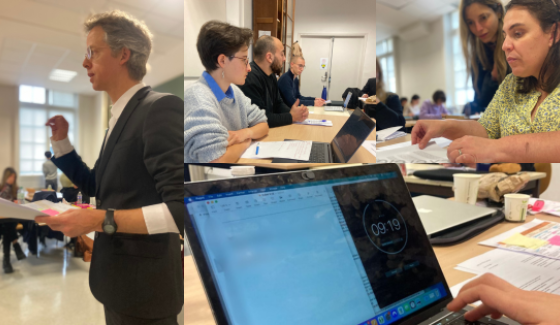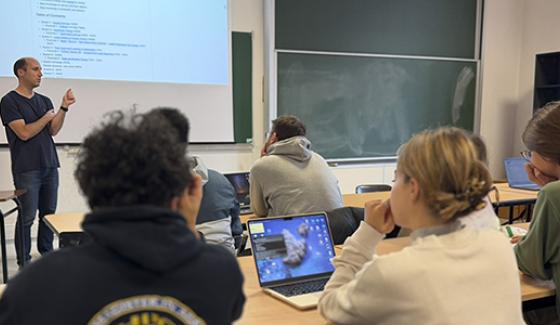Prepare your stay at ENS

Preparing to Study Abroad at the ENS
BEFORE YOUR DEPARTURE:
Depending on your country of origin, you will need to obtain certain documents.
Visa
Citizens of the EU and the Helvetic Confederation do not need a visa. Additionally, under the law of 26 November 2003, they also do not need a titre de séjour (residence permit). Students arriving from other countries, however, will need to request a long-stay student visa type D (CESEDA R311-3 6°) from the French Consulate in their country of origin or residence. The Consulate will give you a VLSTS, as well as an application for an OFFII attestation which you will present to the Service de la Scolarité during your registration at the ENS. (When you attend your appointment at the French Consulate, do not forget to bring the letter you have received from the Director of International Relations at the ENS)
More information on https://france-visas.gouv.fr/en/
Residence permit (titre de séjour)
Applications for residence permits are filled out in person once you arrive in France. This is done in a meeting at ENS organized by the Registrar’s Office.
- All students who are receiving their first residence permits must pay a fee of €58. This fee is due when the permit arrives, approximately six one and a half months after the beginning of the school year.
- Students who are merely renewing their titre de séjour need only pay a fee of €30.
- Undergoing a medical examination is a necessary part of obtaining a titre de séjour.
Very important: Insurance
1/ HEALTH INSURANCE:
- It is essential EXCEPT for students receiving scholarships from the French government
- You must purchase insurance in your country (whether through your university or your family’s insurance plan) BEFORE you leave for France.
- You must confirm the terms and conditions of payment and reimbursement, especially if an agreement between France and your country exists. Do not forget to bring the documentation of these terms translated into French.
NB: In the event that it is not possible to purchase health insurance in your country, if you are under 28 years old and enrolled for a diploma in a Parisian university, you are eligible to participate in the French social security system.
2/ LIABILITY INSURANCE:
It is MANDATORY to enroll in insurance which covers the risk of accidents (fire, etc). On the day that you register at the ENS, you will be able to enroll in liability insurance with one of our partner companies.
Papers and documents to bring to ENS:
Please bring the following documents when you come to register at the ENS:
- Passport
- Birth certificate, translated into French and certified by an official body (this must include the surnames and given names of both parents)
- Residency visa: the visa which has been placed inside your passport must be a type D longstay student visa or a language assistant visa (only for language teaching assistants). When you arrive in France, the ENS will assist you in obtaining your titre de séjour. (As mentioned earlier, if you are a citizen of Switzerland or the EU, you do not need a titre de séjour.)
- Copies of any documents you submitted to the French Consulate
- Proof of scholarship or proof of familial/personal funds to support you during your studies
- At least four recent passport photos that bear your exact likeness (showing your uncovered head and face, size 3.5 cm by 4.5 cm)
- Letters of recommendation from your university
ONLY if you are coming to the ENS to complete the entirety of your degree, you will need to bring:
- The originals of your academic diplomas from secondary school, as well as any tertiary or postgraduate education you may have undertaken
- Photocopies of these diplomas, certified as legitimate by an official body
- Translated versions of these diplomas, translated and approved by an official body
- All corresponding transcripts you have
If you are just registering at the ENS to study abroad, complete an internship abroad, or work as a teaching assistant abroad, you do not need to worry about this second list of documents; they are only necessary for long-term foreign students, not for short-term students.
Accommodation
Your accommodation choices during your time at the ENS will depend, in part, on your status as a student: if you are an international selection student or a normalien, you are eligible to live on the ENS campus. If you are an ERASMUS+ exchange student or are obtaining an ENS diploma, then you will need to find other off-campus accommodation. Some international exchange students are eligible for on-campus housing, depending on the agreement between the ENS and the student's home institution.
ACCOMMODATION AT ENS
Before arriving, inform ENS Housing of the approximate date and time of your arrival by sending an email to the following address: hebergement@ens.psl.eu.
Contacts:
– Jourdan: Tel. +33(0)1 43 13 61 56
– Ulm: Tel. +33(0)1 44 32 32 42; Fax +33(0)1 44 32 30 10
– Montrouge: Tel. +33(0)1 58 07 65 10; Fax +33(0)1 58 07 50 80
If necessary, you can also contact the logistics director for the three sites mentioned:
Mme Isabelle Porte : Tél. 01 43 13 61 00
Housing Office Hours: 9:00-12:00 and 14:00-17:00, Monday -- Friday
If you arrive outside of these hours, notify the accommodation site beforehand, specifying the date and time of your arrival. After communicating with them, you will be also to collect the key to your room at the welcome desk at 45 rue d’Ulm, 48 boulevard Jourdan, or 1 rue Maurice Arnoux in Montrouge.
OTHER ACCOMMODATION
If you are not housed in the ENS dormitories, you can find housing in a student residence. For information on these, consult the websites of CROUS and the Cité Universitaire internationale de Paris.
Reception at the school
1) Academic reception
You will meet the professors who coordinate foreign students’ experiences in each of the school’s 15 departments. The professor in your chosen department will help set up your courses for the year and assign you a tutor (an academic advisor). The teachers at ENS can help you during your stay, indicating the best specialists working in your field, and advising you on how to access the libraries and other resources.
2) Orientation
At the beginning of each academic year, the ENS organizes two weeks of orientation for first year pupils and international students. The orientation consists of conferences as well as guided visits of departments, laboratories, and libraries. Be sure to attend, as you will learn a lot about the classes and campus life at the ENS.
3) Induction weekend
At the end of September, students organize a 3-day weekend trip to a region of France to help all the newcomers to the school get to know each other. This weekend is known as “le Mega”.
Further information can be found in the ENS Guide for International Students:
- All about the ENS
- How to get to ENS from the airports
- Equipment available on the various campuses
- Meals
- Accommodation
- Practical tips on banks, telephones and transport
- Activities at ENS and elsewhere
- The ENS academic year
- The French university system
Mis à jour le 20/2/2026
Dernières actualités de la formation



